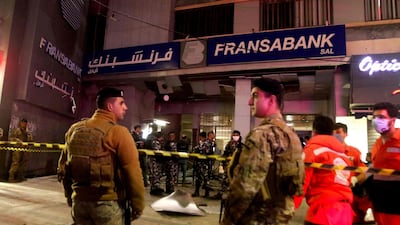As Lebanon starts talks with the IMF for the first ever bail-out in its history, banks and luxury stores have hunkered down behind steel fortifications in downtown Beirut to protect themselves from the mounting violence and despair.
The capital’s upmarket neighbourhood seemed to be readying itself for impending disaster on Wednesday as workers fitted metal sheeting across the front of local banks and international luxury stores.
Key-wielding security guards let bank employees in furtively though streets remained quiet. Very few can still afford to buy anything in the area as Lebanon sinks deeper into an economic crisis that has been compounded by the coronavirus pandemic.
People were tight-lipped, but there was a clear sense of fear of renewed attacks on banks as poverty steadily increases. “People are starving. The police have forbidden any gatherings, but we know they are coming,” said a local.

Lebanon has returned to a full lockdown for four days, from Wednesday evening to Monday morning, in a bid to curb the spread of the coronavirus. With 26 deaths and 878 cases, the pandemic seemed to be under control. But a recent surge in cases has worried local authorities. Hospitals are already stretched.
Photos of the construction work went viral on Lebanese social media after metal reinforcements over four meters high were erected on a building belonging to a local bank that sits on the corner of a busy Beirut highway.
Such widespread use of steel shielding surprised the Lebanese even though increased security measures at banks have been noticeable in the past months after a liquidity shortage caused massive social unrest in October.
Posing as the CEO of one of the banks, comedian Mazen Abdallah poked fun at the security measures in a video that he posted on Facebook last Wednesday.
“The relations between banks and customers have become very difficult due to the fact that we’re not giving anyone any dollars. It’s gotten to the point where people are so angry that they firebombed several of our banks,” he said, referring to incidents across Lebanon these past weeks.
“In response in these difficult times, I have the following to say: bring it on. We are building a giant (expletive) wall around our bank. We’re fortifying it. It’s going to be like a medieval castle,” he continued. “We’re not giving you your (expletive) money, in fact we’re going to make it really difficult for you to even physically get inside the bank.”
Neither BLOM bank, that Mr Abdallah was referring to in his video, nor Fransabank, which also reinforced its building in downtown Beirut with metal sheets in recent days, answered The National's request for comment.
The situation is unlikely to improve any time soon. In its recovery plan unveiled earlier this month, the government said it hoped that the plummeting local currency would eventually stabilise at a rate that is nearly 60 per cent lower than the current official value.
The plan anticipated that inflation would rise this year by over 50 per cent, poverty would increase to 45 per cent of the population, and unemployment to above 35 per cent.
Spurred by the economic crisis, protests were peaceful at first, but became increasingly violent late last year, prompting security forces to install concrete walls and barbed wire near Parliament, where protesters used to congregate before the confinement measures put an end to public gatherings. In recent weeks the protests have started up again.
Today, many shops and banks that were vandalised months ago remain empty and untouched, covered in protesters’ graffiti. On the metal sheets placed on the front of a BLOM bank branch, someone had written in red: “we are coming”. Next to it, someone else had scribbled in black: “we are here.”


